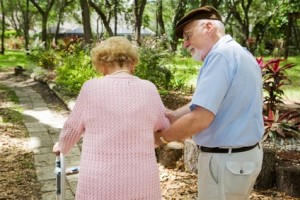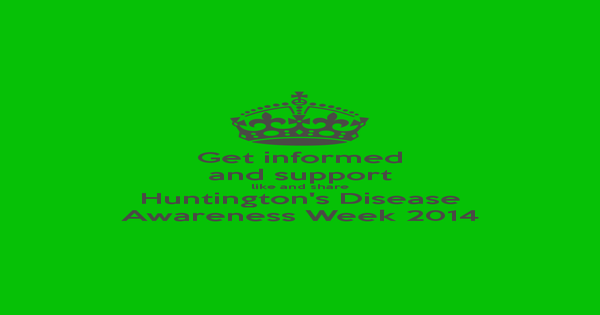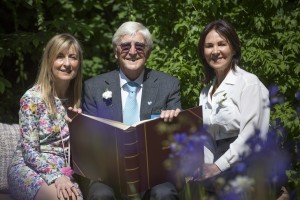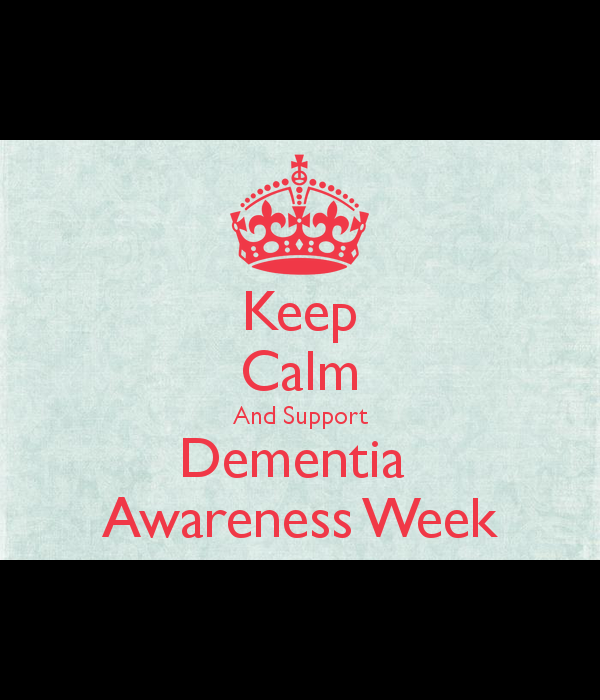
Alzheimer’s disease – a guide
Welcome to our guide to Alzheimer’s and dementia User Guide!
The aim of this blog post is to provide you with an overview of dementia in general and Alzheimer’s in particular. We are very lucky to have the help of Dr Nori Graham who is Medical Director of Red and Yellow Care, Vice President of Alzheimer’s Disease International and The Alzheimer’s Society. She is interviewed along with Bahbak Miremadi a Doctor and a specialist in old age psychiatry.
They are interview on behalf of PatientTalk.Org by Kitty Vine
VINE Nori, what exactly is Alzheimer’s and how does it differ from other types of dementia?
DR GRAHAM Alzheimer’s disease is the commonest type of dementia. I mean dementia is a term that covers one-hundred plus different types of dementia of which Alzheimer’s disease is thought to be still the commonest type and accounts for 50% of cases and it is a disease which manifests itself in a number of different ways but principally with loss of memory,
difficulties with language, with judgement and decision making and over the course of many years a loss of sense of time and place and often some changes in personality. But nobody of course has all these things all at the same time, it is very different from person to person. One person with dementia is going to be different from the next one.
VINE Bahbak, can you tell me about the findings of the ‘Good Life with Dementia’ report?
DR MIREMADI Yes, we at Red and Yellow Care are very proud in association with the Alzheimer’s Society to be publishing this independently produced report which I think really does a lot to challenge the stigma associated with the condition. I think that in both public and professional minds dementia has still got many negative connotations and that negative stigma still is probably the primary barrier to people being able to lead a good life and so the report highlights six key areas where people with dementia can potentially focus on to live a good life. It is important to caveat here that the report doesn’t in any way diminish the fact that dementia is an incredibly difficult and challenging condition, or can be an incredibly difficult and challenging condition, not just for the person experiencing it but notably for the family, carers and loved ones. But what it is suggesting is that by focussing on the individual, by not just saying ‘one size fits all’ by focussing on the moment as oppose to just constantly trying to help the person remember the past, by focussing on their relationships and allowing them to experience both positive and negative emotions. By allowing them to take risks and these are reasonable risks, these are not risks that are not appropriate to their lives like going out to the shops or going for a walk in the park, things that they would do normally that often people with dementia are prevented from doing and finally by promoting their physical, mental and social health in a holistic way that these six areas can be focussed on, lead to a good life with dementia.
VINE Back to you Nori. What are the early signs of Alzheimer’s?
DR GRAHAM The commonest early sign is forgetfulness and this can happen quite slowly and in quite a subtle way over quite a long period of time. Somebody might be forgetful over something very obvious but it only becomes apparent some time later. And this is normally forgetfulness in the short term but the symptom when it starts hitting families that something is wrong is when people are unable to remember where they live and they get lost and they are trying to make their way back home, where people begin to forget how to care for themselves and remembering to dress and wash appropriately, remembering whether they have just had their breakfast or lunch and asking to have it again. These are some of the ways in which memory loss appear to start off with, followed by an association with memory loss, a loss of sense of time and getting very confused over day and night. And disorientation in place as I have just mentioned and losing the ability to take part in conversations unless somebody directs it specifically to them and encourages them in their own right to respond, and a general disengagement of things going on around them.
VINE What tests are used in the diagnosis of Alzheimer’s?
DR GRAHAM There is no specific test to diagnose Alzheimer’s. The way that one achieves a

Alzheimer’s disease – a guide – at the doctor’s office
diagnosis is mainly taking a really good clinical history from the person with the problems but more particularly from somebody who is living close to them; either a spouse or member of their family or close friend who can describe how the symptoms have started and describe somebody’s past history, previous personality and occupation so that you get some idea of the person’s life and in putting that together with a comprehensive physical examination which is really important and carrying out a clinical mental state examination and one or two clinical tests, that’s the start of achieving a diagnosis and sometimes one has to back that up with a few tests. The most well-known scans or some neuropsychological testing but all that information together normally helps you to quite confidently make a diagnosis.
VINE Bahbak – can you tell me about the differences between mild, moderate and severe cases of Alzheimer’s?
DR MIREMADI Yes, I mean the definitions of mild, moderate and severe really vary from individual to individual and I think the most important thing to remember with dementia is that the progression is different for each individual case. And that is probably part of the wider message of the report and what we are trying to achieve at Red and Yellow Care which is that you need to focus on the individual. One person’s symptoms in the mild stage actually might be another person’s symptoms in the moderate stage. And although there are common symptoms, if you are going to generalise such as loss of language or getting confused with your words or being a bit forgetful or repeating yourself in the earlier stages and as the condition progresses you can have a change in personality that goes with that. And you get more disorientated in time and place in terms of where you are and whether it is day or night and your rhythms go out of sync. But I think the most important message that I would like to get across, I think probably Dr. Graham would agree with me on this is that each individual case with dementia is different from another.
VINE What treatments are available?
DR MIREMADI There are a range of treatments available. At one end of the spectrum there are drug therapies. It is where people’s minds first go when they think of the word treatment; however unfortunately there is no cure for dementia. There are certain drugs – they are known as sterile cholinesterase inhibitors, which is a pharmacological term for them in the main that are commonly used in the early stages. They are not suitable for all types of dementia so there is drug therapy. However the important thing to remember is actually it is about looking at the person in the round, it is about looking at the person’s wider physical issues but also other mental health issues they might have alongside the social problems and it is only really when you integrate those and combine them and address them together that you can have the most impactful outcomes in terms of the quality of people’s lives. So in mental health terms, are they suffering from depression, are there other issues that need to be treated and dealt with. In social terms, what is going on with their relationships, what is going on with their finances? And are they enjoying life? Are they feeling fulfilled? All those experiences as well as the physical health issues that they may have, they all need to be dealt with hand in hand, hand in glove in an integrated way and that’s what we are setting out in Red and Yellow Care; offer an integrated approach that covers all the different aspects of a person’s life.
VINE How effective are the treatments?
DR MIREMADI Again, I think it varies from individual to individual and each case will require a different set of interventions and treatments. The effectiveness of that will again vary but what we do know is that there is an increasing amount of evidence to show that by looking at people in the whole, by addressing their physical problems, mental health problems and social care problems together that actually that can be very, as I said before, impactful on their lives and significantly improve their quality of life. I don’t know if there is anything you want to add on to that Dr Graham?
DR GRAHAM I think really the most important thing to appreciate is that this disease has its course, it may last many years, and there is no cure. But all the things that Dr Miremadi has talked about in terms of treating the whole individual and their family and supporting them appropriately through the course of the illness makes a very big difference to the amount people can enjoy and have a better quality of life.
VINE When it comes to care, what sort of care does a person with Alzheimer’s require?
DR GRAHAM I think the most important thing is that after diagnosis the person and their family need a single point of contact and this is what we are providing in Red and Yellow Care and that single point of contact with us is a specialist dementia nurse who will visit regularly and be in touch regularly with the person and their family and will be backed, supported by and bringing in other professionals as and when needed. And they will be needed at some point during the course; occupational therapists, legal and financial advisors, a number of different social care opportunities, attention to physiotherapies and geriatricians as and when needed. And I think that that is a gap at the moment in services provided in our country. The services are there but it is always very difficult to know where to go and how to access them. By giving people a single point of contact in terms of a named dementia nurse they can turn to twenty four seven and who will know all about them and talk through with them problems as they arise I think is the key to a better life with dementia.
VINE What one piece of advice would you give to a person who has just been diagnosed with Alzheimer’s?
DR GRAHAM Well if they live in London I hope they will contact Red & Yellow Care because I think that we can help them and support them. I think they should know that it is possible to lead a good life but it is necessary to be able to turn to somebody professional who can help advise them and support them and very often that person will be their general practitioner.
VINE Finally to both of you how do you see the future of Alzheimer’s treatment? Do you think there could be a cure?
DR MIREMADI I think that’s a difficult question to give a short answer to because I think it’s a time frame thing. I think that ultimately we will get there and I think that we will ultimately get there. The recent G8 Summit on dementia has highlighted, has been put down the gauntlet really with a date, a treatment to either offer a cure or to modify the condition by 2025 and that is a great thing to be aiming for. There are all sorts of research going on now and it’s picking up momentum and money is going into it so I think people should be hopeful. However I think that it’s important to not lose sight of the fact that there are eight hundred thousand plus people in the UK today with dementia and they need, many of them need a diagnosis in the first instance and second instance they need good care. Although it is right that we should focus on trying to get a cure we should not forget the need to address the very difficult and challenging journeys that people with dementia go through and their families and carers go though.
VINE Do you have anything to add to that, Nori?
DR GRAHAM Well I would certainly endorse what Dr Miremadi has just said that there is some very exciting research going on, not just only in our country but in other countries around the world. So there is hope but meanwhile yes, we have eight hundred thousand people in this country with dementia and we have forty-four million people with dementia throughout the world who have got dementia now and who need, less than half receive, a diagnosis at the moment but even more importantly the gap after diagnosis, lack of specialist care, that’s where we need to focus our minds now.





